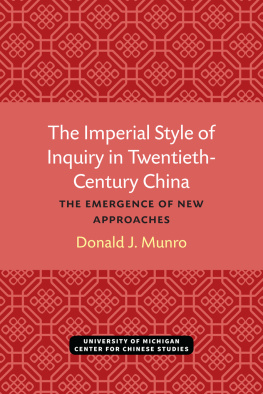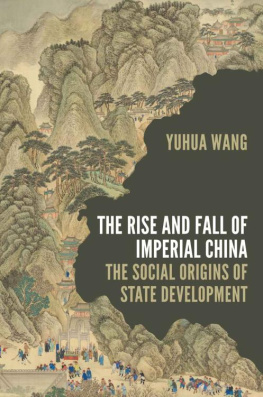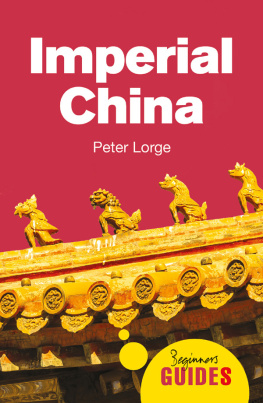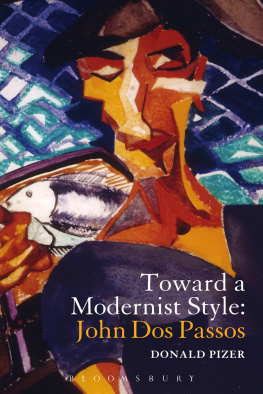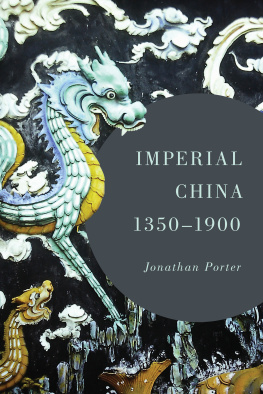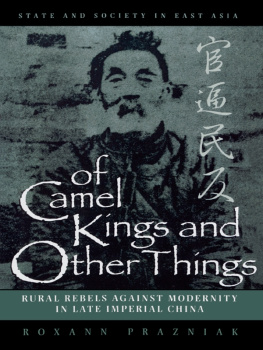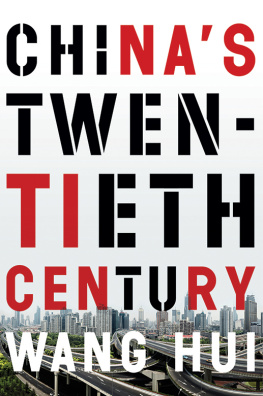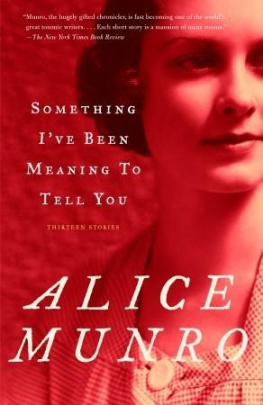Donald J. Munro - The Imperial Style of Inquiry in Twentieth-Century China
Here you can read online Donald J. Munro - The Imperial Style of Inquiry in Twentieth-Century China full text of the book (entire story) in english for free. Download pdf and epub, get meaning, cover and reviews about this ebook. year: 2020, publisher: Kenneth G. Lieberthal and Richard H. Rogel Center for Chinese Studies, genre: Religion. Description of the work, (preface) as well as reviews are available. Best literature library LitArk.com created for fans of good reading and offers a wide selection of genres:
Romance novel
Science fiction
Adventure
Detective
Science
History
Home and family
Prose
Art
Politics
Computer
Non-fiction
Religion
Business
Children
Humor
Choose a favorite category and find really read worthwhile books. Enjoy immersion in the world of imagination, feel the emotions of the characters or learn something new for yourself, make an fascinating discovery.
- Book:The Imperial Style of Inquiry in Twentieth-Century China
- Author:
- Publisher:Kenneth G. Lieberthal and Richard H. Rogel Center for Chinese Studies
- Genre:
- Year:2020
- Rating:4 / 5
- Favourites:Add to favourites
- Your mark:
- 80
- 1
- 2
- 3
- 4
- 5
The Imperial Style of Inquiry in Twentieth-Century China: summary, description and annotation
We offer to read an annotation, description, summary or preface (depends on what the author of the book "The Imperial Style of Inquiry in Twentieth-Century China" wrote himself). If you haven't found the necessary information about the book — write in the comments, we will try to find it.
The Imperial Style of Inquiry in Twentieth-Century China — read online for free the complete book (whole text) full work
Below is the text of the book, divided by pages. System saving the place of the last page read, allows you to conveniently read the book "The Imperial Style of Inquiry in Twentieth-Century China" online for free, without having to search again every time where you left off. Put a bookmark, and you can go to the page where you finished reading at any time.
Font size:
Interval:
Bookmark:

The Imperial Style of Inquiry in Twentieth-Century China
The Imperial Style of Inquiry in Twentieth-Century China
The Emergence of New Approaches
Donald J. Munro
The University of Michigan
CENTER FOR CHINESE STUDIES
THE UNIVERSITY OF MICHIGAN
ANN ARBOR
MICHIGAN MONOGRAPHS IN CHINESE STUDIES
ISSN 1081-9053
SERIES ESTABLISHED 1968
VOLUME 72
Published by
Center for Chinese Studies
The University of Michigan
Ann Arbor, Michigan 48109-1290
First Edition 1996
1996 Center for Chinese Studies
The University of Michigan
All rights reserved
Printed and made in the United States of America
 The paper used in this publication meets the minimum requirements of the American National Standard for Information SciencesPermanence of Paper for Publications and Documents in Libraries and Archives ANSI/NISO/Z39.481992.
The paper used in this publication meets the minimum requirements of the American National Standard for Information SciencesPermanence of Paper for Publications and Documents in Libraries and Archives ANSI/NISO/Z39.481992.
Library of Congress Cataloging-in-Publication Data
Munro, Donald J.
The imperial style of inquiry in twentieth-century China : the emergence of new approaches /
Donald J. Munro 1st ed.
p. cm.
(Michigan monographs in Chinese studies, ISSN 1081-9053 ; v. 72)
Includes bibliographical references and index
ISBN 0-89264-120-7 (alk. paper)
1. Inquiry (Theory of knowledge)
2. Social epistemologyChina.
3. ChinaCivilization20th century.
I. Title. II. Series.
Michigan monographs in Chinese studies ; no. 72
BD183.M86 1996
181M1dc20 96-256
CIP
ISBN 978-0-89264-120-8 (hardcover)
ISBN 978-0-472-03824-4 (paper)
ISBN 978-0-472-12782-5 (ebook)
ISBN 978-0-472-90178-4 (open access)
Derived from the authors
Distinguished Senior Faculty Lectures,
presented in 1994 on the occasion
of his receipt of the
Warner G. Rice Humanities Award,
College of Literature, Science, and the Arts,
The University of Michigan
For Betty, Cynnie, and Ellie.
Contents
Chapter One
The Imperial Style of Inquiry
Chapter Two
Modern Exemplars of the Imperial Style
Chapter Three
Three Modern Models
Chapter Four
The Emergence of Objectivity in Modern Chinese Inquiry
Chapter Five
The Emergence of Autonomy as a Chinese Social Value
This book examines the endurance in modern China of old philosophical ideas about knowledge and inquiry. These ideas are rooted in Neo-Confucian doctrines. They coexist along with other, different ideas about and approaches to the project and process of inquiry. The book also examines the impact of those ideas on problem solving. This includes the influence of philosophical ideas on proposing solutions to social or technical problems. Such solutions often have political policy implications. If the tone of the first three chapters is critical of old ideas as obstructions to inquiry, the last two are optimistic. They focus on signs of departure that I suggest will facilitate the solving of social problems.
Early in the book I describe Chinese totalism, a Confucian belief that there is an ordered structure integrating everything that exists; the same order runs through both the human and natural spheres. This belief justifies imperial authority by making the emperor responsible for the harmony of all the related parts. Totalism also supports a theory about the investigation of things that is highly authoritarian. It centers on copying antecedent models, whose ultimate legitimacy comes from the emperor. The models ensure that any particular situation under study will be understood in terms of the officially recognized, integrated totality.
This theory about the investigation of things also prizes clarifying the mind so it can intuit in itself the innate patterns that structure the world. Patterns in the human mind are believed to parallel in totality the actual patterns in nature, a belief that owes much to the Neo-Confucian Zhu Xi (11251200). These patterns provide information that is both descriptive and prescriptive, about how things predictably do and should behave. This is an aspect of what I call the fact-value fusion. I first discussed this phenomenon in historical context in (The Nature of Mind) of my book, The Concept of Man in Contemporary China (Ann Arbor: University of Michigan Press, 1977). The idea of a fact-value fusion plays a significant role in the present book.
I call this Confucian theory about the investigation of things the Imperial style of inquiry, because it had the imperial imprimatur from 1313 until 1911, embodied in the authority of the philosophy of Zhu Xi and the Four Books of Confucianism for civil service examination purposes. It also assumes the emperors role in maintaining the harmony of the whole. Sometimes I will refer to it as the Confucian style of inquiry.
I will criticize those aspects of the belief in an integrated totality that lead investigators to seek in nature what are really only human traits and to expect to find in nature what are exclusively human values. I also criticize aspects of the reliance on antecedent models in inquiry.
I want to prevent two dangerous but possible misunderstandings about the positions I take in this study. The first is that I affirm both the possibility and desirability of separating in every way the realms of humans and of nature. In fact, I do not. Rather, I affirm the interdependency of the two: what happens to one usually affects the other, and humans can indeed act so as to improve the ecological health of living things. What I reject is the inference from interdependency that the so-called essential traits of humans and nature are the same. Doubtless some traits overlap, but humans are purposive, evaluating beings; we are conscious of hierarchy. I reject the attribution of hierarchy, purpose, and other value traits to nature and try to show that such attributions inhibit objective inquiry. My critique applies equally to China and to Europe.
The other potential misunderstanding is that I advocate the elimination of existing values from the process of inquiry in China and favor instead the substitution of liberal democratic American ones. In fact, I do not believe that it is desirable or possible to eliminate received values from the minds of those doing problem solving. What I favor is the incorporation of epistemic values consistent with the goals of science into the problem-solving process. I reject political or social values imposed by those with political power. Sometimes there is overlap in the terminology or content used to describe the epistemic values and the liberal democratic ones, but they are not identical. Freedom and autonomy are common to both. For example, the value of free and open communication and dissemination of information is consistent with scientific goals; so is individual autonomy in judging facts. In succeeding pages, I will try to make the case that developments in China fostering such autonomy are consistent with scientific inquiry. It is precisely on this matter of autonomy that critics will think I am most vulnerable, and so it requires special attention here.
A critics potential misunderstanding will rest on the belief that I am advocating some value within Western individualistic ethics as a substitute for collectivist Confucian or Maoist values. This would mean that I am advocating individual autonomy as an intrinsic value, worth pursuing and prizing for its own sake. It might mean that I favor unconventional thinking or acting for its own sake. In fact, I advocate nothing of the kind. I am promoting individual autonomy as an instrumental value, worthwhile because it contributes to the
Font size:
Interval:
Bookmark:
Similar books «The Imperial Style of Inquiry in Twentieth-Century China»
Look at similar books to The Imperial Style of Inquiry in Twentieth-Century China. We have selected literature similar in name and meaning in the hope of providing readers with more options to find new, interesting, not yet read works.
Discussion, reviews of the book The Imperial Style of Inquiry in Twentieth-Century China and just readers' own opinions. Leave your comments, write what you think about the work, its meaning or the main characters. Specify what exactly you liked and what you didn't like, and why you think so.

